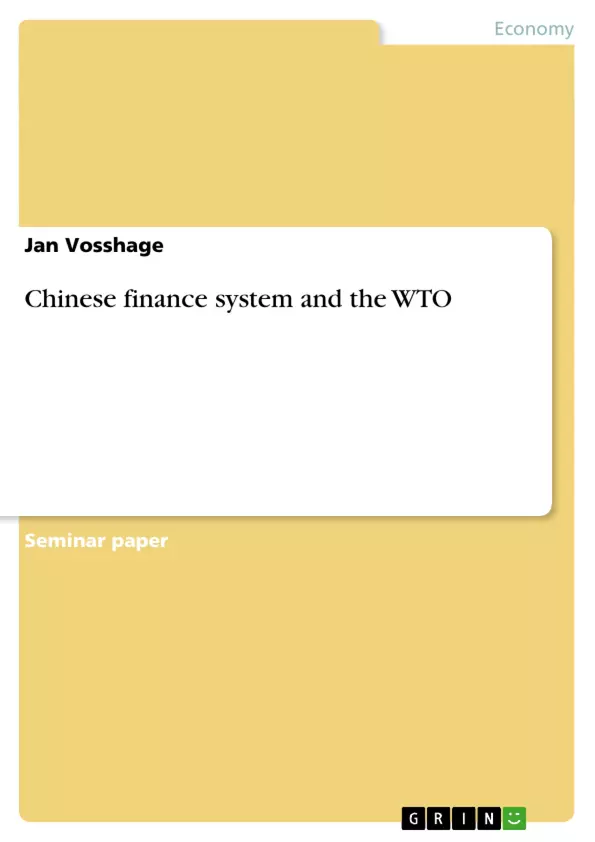At a time in which geographical frontiers blur, the globalization unstoppably strides away and the world economy becomes more and more important, it is more significant, to have uniform guidelines to exclude discrimination and guarantee peaceful cooperation with each other.
For a country is it very important to be in accordance with the international claims, in order to be competitive. Since the last decade, China has been opened politically and economically. Thus they attempted to clear the existing delay as fast as possible, to develop a connection to economic leaders such as the US or Europe and then itself to play a significant role in the international economy. A step toward this goal was the entry into the World Trade Organization (WTO).
The following paper will tackle this topic, including analyzing the impact of the WTO on the Chinese finance system. But first, I will go over some details about the WTO, its agreements and principles. After this, I will discuss the course of Chinese entry and the ensuing problems. In the second part of the paper, the Chinese finance system will be explained, and more precisely, the Chinese banking system. At this I will illustrate the history of the banking system, the role of foreign banks in China before entry into the WTO and then present the problems of the system. In the third part it will analyze the variances and ascendancies, also the pros and cons of inclusion in the WTO.
Inhaltsverzeichnis (Table of Contents)
- Introduction
- The World Trade Organization
- Agreements and principles from the WTO
- China's way into the WTO
- Chinese finance system
- Chinese banking system – history –
- Chinese banking system - problems –
- Chinese banking system – foreign banks before the WTO –
- Chinese banking system and the entry into the WTO – influence and changes –
- Concluding Remarks
- Reference
Zielsetzung und Themenschwerpunkte (Objectives and Key Themes)
This paper examines the impact of the World Trade Organization (WTO) on the Chinese finance system. It analyzes the WTO’s agreements and principles, the process of China’s entry into the WTO, and the ensuing challenges. The paper then delves into the Chinese finance system, specifically the banking system, its history, problems, and the role of foreign banks before the WTO. Finally, it analyzes the effects of China's WTO membership on the banking system, highlighting the changes and challenges it brought.
- The impact of WTO membership on China's finance system
- The Chinese banking system and its historical development
- The role of foreign banks in China's financial landscape
- The challenges and opportunities posed by WTO membership for China's banking system
- The process of China's entry into the WTO and its implications for the finance system
Zusammenfassung der Kapitel (Chapter Summaries)
- Introduction: This chapter sets the stage for the paper by discussing the importance of globalization and the need for uniform guidelines to facilitate international trade and cooperation. It highlights China's political and economic opening up in recent decades and its ambition to play a significant role in the global economy, with joining the WTO as a crucial step. The chapter outlines the paper's structure, which focuses on analyzing the impact of the WTO on the Chinese finance system.
- The World Trade Organization: This chapter introduces the WTO, its role as the sole global organization governing international trade rules, and its key objectives. It highlights the importance of the WTO in promoting free trade, reducing trade barriers, and raising living standards globally. The chapter discusses the WTO's membership and its significance in the global trade landscape.
- Agreements and principles from the WTO: This chapter focuses on the three main agreements that form the foundation of the WTO: GATT, GATS, and TRIPS. It outlines the fundamental principles of the WTO derived from these agreements, emphasizing the importance of trade without discrimination, free trade, predictability, fair competition, and promoting development and economic reforms. The chapter specifically explains the most-favored-nation (MFN) treatment principle, which requires WTO members to offer equal treatment to competing suppliers.
Schlüsselwörter (Keywords)
The primary keywords and focus topics of this paper are: Chinese finance system, World Trade Organization (WTO), banking system, foreign banks, WTO membership, globalization, trade liberalization, trade barriers, non-discrimination, free trade, and economic reforms.
Frequently Asked Questions
How did WTO membership impact the Chinese banking system?
Entry into the WTO forced China to open its financial sector to foreign competition, leading to significant structural reforms and modernization of its banking practices.
What are the core principles of the WTO discussed?
Key principles include non-discrimination (Most-Favored-Nation treatment), free trade through the reduction of barriers, predictability, and fair competition.
What role did foreign banks play in China before WTO entry?
Foreign banks had very limited access and faced numerous restrictions; the WTO agreements were a turning point for their expansion into the Chinese market.
What were the main problems in the Chinese banking system?
Historically, the system struggled with non-performing loans, lack of transparency, and heavy state influence, which the WTO reforms aimed to address.
What are GATT, GATS, and TRIPS?
These are the three main WTO agreements covering trade in goods (GATT), trade in services (GATS), and intellectual property rights (TRIPS).
- Citar trabajo
- Jan Vosshage (Autor), 2004, Chinese finance system and the WTO, Múnich, GRIN Verlag, https://www.grin.com/document/25819



